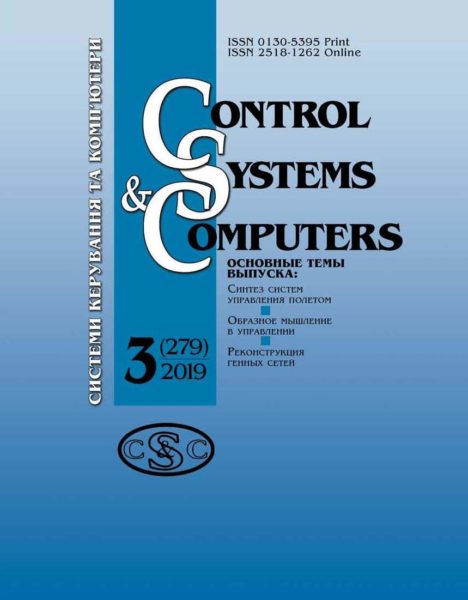Control Systems and Computers, N1, 2021, Article 6
https://doi.org/10.15407/csc.2021.01.062
Control Systems and Computers, 2021, Issue 1 (291), pp. 62-70.
UDC 364.2:331; 681.513
Strokan Oksana, PhD (Eng.), Associate Professor, Dmytro Motornyi Tavria State Agrotechnological University, B.Khmelnytsky Ave, 18, Melitopol, Zaporizhzhia obl., 72312, Ukraine, oksana.strokan@tsatu.edu.ua, https://orcid.org/0000-0002-6937-3548
Pryima Serhii, DSc (Ped.), Professor, Dmytro Motornyi Tavria State Agrotechnological University, B.Khmelnytsky Ave, 18, Melitopol, Zaporizhzhia obl., 72312, Ukraine, pryima.serhii@tsatu.edu.ua, http://orcid.org/0000-0002-2654-5610
Rogushina Julia, PhD (Ph.-Math.), Associate Professor, Institute of Software systems of National Academy of Sciences of Ukraine, Academician Glushkov Ave, 40, Kyiv, 03680, Ukraine, ladamandraka2010@gmail.com, http://orcid.org/0000-0001-7958-2557
Gladun Anatoly, PhD (Eng.), Associate Professor, International Research and Training Center of Information Technologies and Systems of National Academy of Sciences of Ukraine and Ministry of Education and Science of Ukraine, Academician Glushkov Ave, 40, Kyiv, 03680, Ukraine, glanat@yahoo.com, https://orcid.org/0000-0002-4133-8169
Lubko Dmytro, PhD (Eng.), Associate Professor, Dmytro Motornyi Tavria State Agrotechnological University, B.Khmelnytsky Ave, 18, Melitopol, Zaporizhzhia obl., 72312, Ukraine, di75ma@gmail.com, https://orcid.org/0000-0002-2506-4145
Mozgovenko Andriy, Dmytro Motornyi Tavria State Agrotechnological University, B.Khmelnytsky Ave, 18, Melitopol, Zaporizhzhia obl., 72312, Ukraine, andrii.mozghovenko@tsatu.edu.ua, https://orcid.org/0000-0002-7445-8925
AdvisOnt: semantization of agricultural advisory services for validation of outcomes of non-formal and informal learning. I
Introduction. A characteristic feature of the modern agricultural sector is the use of advisory that provides the implementation of modern technologies into the production process. We analyze the specifics of existing advisory systems, their goals, main activities, and problems. This analysis causes expediency of documentation and validation of informal and non-formal outcomes of learning typical for agriculture and their processing by knowledge-oriented services based on modern Semantic Web technologies and resources.
Purpose. This work is intended for the integration of labour and education markets and is aimed at semantization of agricultural advisory services for expansion of advisory system functionality with the help of validation of outcomes of non-formal and informal learning of potential employees. Processing of semantics is based on the use of knowledge about agriculture subjects from internal and external ontologies by advisory intelligent applications. Such processing requires the creation of a relevant formal model that describes all main objects and subjects of agro-advisory activities, development of formalization methods for model components and defining of matching criteria based on internal and external ontologies. Software realization of proposed solution by AdvisOnt system is aimed at demonstration of its efficiency for practical agro-advisory tasks and advantages of semantic approach.
Methods. In this work, we use methods of mathematical modeling, elements of ontological analysis and logical inference.
Results. We propose an advisory system AdvisOnt that analyses the outcomes of non-formal and informal learning and ensures their validation for more efficient matching of information about potential employees, employers and agricultural educational resources. AdvisOnt is based on the ontological representation of this knowledge formalized by competencies, vacancies, training courses, user profiles, etc. The system is aimed to generate recommendations for employment or further learning of necessary competencies by matching these objects. External knowledge bases are used for the semantic formalization of vacancies and resumes for their more pertinent matching with the help of agricultural domain knowledge and competence classifications. AdvisOnt users receive recommendations on employment and about training courses that provide advisable competencies.
Conclusion. Sustainable development of agro-industrial production needs rapid dissemination of agricultural knowledge and information, mobility and continuous training of agricultural professionals provided by advisory systems.
We suggest how using ontological knowledge for advisory services allows to expand the possibilities of counseling. In the future, we plan to consider the ways of integration of the AdvisOnt system that validates outcomes of informal and non-formal learning with other counseling and recommendation systems in the field of education and employment taking into account the specifics of the agricultural sector through external domain and organizational ontologies. The openness of the proposed solution is based on Semantic Web technologies and service-oriented programming.
Download full text! (On Ukrainian)
Keywords: advisory service, ontology, competence analysis, learning outcomes, non-formal learning, informal learning, AdvisOnt, Semantic Web.
- Law of Ukraine, 17 June 2004. 1807-IV: Pro silskohospodarsku doradchu diyalnist [On the agricultural advisory activity], Information of the Verkhovna Rada, 38. p. 470. [online] Available at: <https://zakon.rada.gov.ua/laws/show/1807-15>. (In Ukrainian).
- Zhemoyda O., Herasymenko N., 2011. “Suchasni napryamky doradnytstva v silskomu hospodarstvi Ukrayiny” [“Modern trends of advisory services in Ukraine’s agriculture”], Zbirnyk naukovykh prats Vinnytskoho natsionalnoho ahrarnoho universytetu. Seriya: Silskohospodarski nauky [Proceedings of Vinnytsia National Agrarian University. A series of agricultural science], 12 (52), pp. 115-117. (In Ukrainian).
- Shapoval O. F., Kalna-Dubinyuk T. P., Hnidan M. M., Bas O. I., 2016. “Informatsiyni tekhnolohiyi v konsaltynhoviy diyalnosti doradchykh sluzhb” [“Information technologies in extension services consulting activities”], Wspolpraca Europejska, Consilium Limited Liability Co., Warshawa, 1 (8), pp. 62-70. [online] Available at: <http://dspace.nuft.edu.ua/jspui/bitstream/123456789/22868/1/3.pdf> (In Ukrainian).
- Klochan V. V., 2011. “Formuvannya systemy informatsiyno-konsultatsiynoho zabezpe-chennya ahrarnoyi sfery v Ukrayini” [“Formation of the system of information and consulting support for the agricultural sector in Ukraine”], Kultura narodov Prychernomorya [Culture of the peoples in the Black Sea region], 218, pp. 106-108. (In Ukrainian).
- Kalnaya-Dubinyuk T. P., Kudinova I. P., 2016. “Razvitiye elektronnoy sistemy e-extension v Ukraine” [“E-extension system development in Ukraine”], European Cooperation, 10 (17), pp. 39-47. (In Russian).
- Verba V. A., 2008. “Upravlinske konsultuvannya: svitovi ta rehionalni tendentsiyi rozvytku” [“Management consulting: global and regional tendencies of development”], Actual problems of economics, 11 (89), pp. 21-27. (In Ukrainian).
- Borodina O. M., 2001. Silskohospodarske doradnytstvo ta problemy yoho kadrovoho zabezpechennya [Agricultural advisory services and problems of their human resourcing], INE UAAN, Kyiv, 75 p. (In Ukrainian).
- Dotsenko L. V. 2003. “Osoblyvosti orhanizatsiyi doradchykh sluzhb v pivdennomu rehioni” [“The specific features of advisory services establishment in the southern region”], Ekonomika APK [Economics of agro-industrial complex], 6, pp. 33-40. (In Ukrainian).
- ESCO (the European Multilingual Classifier of Skills, Competences, Qualifications and Occupations). [online] Available at: <https://ec.europa.eu/esco/portal/home>.
- EURES. [online] Available at: <http://ec.europa.eu/eures>.
- Berners-Lee T., Hendler J., Lassila O., 2001. “The semantic web”, Scientific american, 284 (5), pp. 34-43.
Received 19.11.2020



